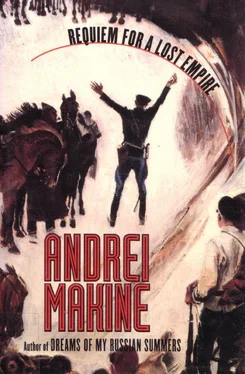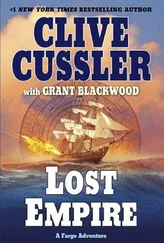The boy takes the gift and remains dumb. With a mechanical gesture he strokes the fabric, notices the lines of stitching, absolutely regular although done by hand. By hand… with sudden pain he thinks of her right hand, the hand wounded by shrapnel, those numb fingers that must have been forced to master the to-and-fro of the needle. He understands that all the truth in the world is nothing if you omit this hand streaked with a long scar. That the world would make no sense if one forgot the life of this woman, come from abroad, who has unflinchingly shared the destiny of that great white void, with its wars, its cruelty, its beauty, its suffering.
He sinks his head lower and lower so as not to show his tears. The woman sits down, ready to begin reading again. Just before her first sentence he blurts out in a halting whisper, "Why did the firing squad kill him?"
The woman's reply does not come straight away. From one Saturday to the next, it will take several months. She will speak of a family in which, little by little, the boy comes to recognize people who had previously only existed in the misty legends of his childhood. Her recital will reach its conclusion one summer's evening after the sun has set, in the still warm and fluid air that bathes the steppes.
It was this light that I had in my mind's eye as I told my silent story, relating to you what Sasha had told me.
The horse turned its head slightly, its eye violet, reflecting the brilliance of the sunset, the sky clear and cold. Nikolai slipped his hand beneath its mane, gently patted its warm neck, heard a brief, plaintive sigh in reply. They were walking along the edge of a forest which, at nightfall, seemed endless and gave off the scent of the last sheets of ice lurking in the thickets. Nikolai knew that at any moment the horse would repeat the maneuver, a look turned toward its rider, an imperceptible slowing down of its pace. He would then have to chide it gently, in a soft voice, "For shame, lazybones! He wants to turn in already. Very well, if that's how it is, I'll have to sell you to the bandits. See how you like that." At these words the horse lowered its head, with an air at once resigned and sulky. After their two years at war together it even understood its rider's jokes.
These hours of dusk were the best time to avoid meeting anyone. You could still see where the horse was putting its feet but in the open camps scattered across the plain the soldiers were already lighting fires and it was easier to skirt around them. He had to avoid the Reds, whose troops he had just quit. To avoid the Whites, for whom he was still a Red. To steer clear of armed bands, who varied their color to suit their looting. And the forest in spring, with the leaves still in bud, offered poor protection.
He had already been riding for more than a week, first traveling up the course of the Don, then turning off toward the east. The steppe, up till then monotonous and flat, was now broken up by forests and valleys. There were more villages. During the first days he took his direction from the river and from the sun. Everywhere it was the same limitless Russian soil. But the closer he came to his own village the more his perception seemed to sharpen. As if the lands he was crossing had changed in scale, so that places came into focus with more and more detail. The day before, still dimly, he thought he had recognized the white steeple of the district capital. That morning a bend in a river, with the bank all trodden down at the approach to a ford, reminded him of a journey he had made before the civil Avar. Now he was almost sure he could travel clear of the forest before nightfall and link up with a road they used to take to go to the fair in the town. Yes, the corner of the forest, then a sandy slope, then, off to the right, this road. Half a day's trot from home.
During his long journey Nikolai had seen fields strewn with the bodies of men and horses left behind after a battle, villages populated by corpses hanging in front of doorways, and also that face he had at first taken for his own reflection when he peered into a well, before realizing… Dead people, fire, ruined houses no longer surprised him as long as he was a part of that immense ragged army, marching toward the south, driving the Whites before it. Killing and destruction was what war was all about. But now in the silence and emptiness of sunny days in May, and, above all, in the radiance of the evenings, the battlefields and deserted villages he skirted around were detached from the war, from its logic, from its causes, which a week earlier had seemed to justify everything. No more logic now. A field abandoned, as if capriciously. No sod turned, no seed sown for two springs. And there, on a slope running down to a little stream, the blackened, swollen carcass of a horse. And the cawing that rent the silence as the horseman approached.
Yet at the start of the war, it was the capriciousness of it that had carried him away. The commissars' talk was all of the new world, and the first novelty was that you could give up plowing. Just like that, on a whim. He was twenty-four at the time and not easily imposed on, but the freedom they offered him was too tempting: to do no plowing! It was intoxicating. They also said the bloodsuckers must be killed. Nikolai remembered Dolshansky, the landowner to whom their village had once belonged. Dolshanka, it was called. And he tried to picture this ancient nobleman as a bloodsucker. It was not easy. Among the peasants only the oldest had experienced serfdom. The village was rich. Dolshansky, long since ruined, lived in more poverty than some of the peasants, and had only one obsession: he spent his time carving the wood for his own coffin. No, it was better to picture the bloodsuckers in general, then one's anger mounted and slashing, shooting, and killing became simpler.
The horse lowered his head. His pace slowed and Nikolai felt a slight jolt: the filly walking behind, attached to a rope, was moving sleepily along and each time they slowed down it bumped its head against his horse's hindquarters. Nikolai smiled and thought he could hear something like a stifled laugh in the horse's brief snort. He did not scold him, simply whispered, "Come along, Fox, we've not far to go. Once we're past the forest we can rest!"
It was not his red coat but his cunning that had earned the horse this name. To begin with Nikolai had thought he was simply stubborn. In one of the first battles Fox had refused to launch into the attack with the others. Some fifty cavalrymen were due to come surging out of a copse and bear down on the soldiers preparing to ford a river with a convoy of wagons. The commanding officer had given the sign, the cavalry hurtled forward, accompanied by a whirlwind of broken branches. But Nikolai's horse reared up, pranced about on the spot, wheeled around, and would not go. He had beaten him savagely, kicking his sides with his heels, whipped him furiously, smacked his muzzle. The worst of it was that the success of the attack seemed a foregone conclusion. On the riverbank the soldiers, taken by surprise, did not even have time to pick up their rifles. And he, meanwhile, was still struggling with that damned horse. The cavalry were a hundred yards from the enemy, they were already crowing with delight when two machine guns, in a terrible flank assault, began to mow them down with the precision of an aim calculated in advance. The cavalrymen were falling before they realized it was a trap. Those who succeeded in turning around were pursued by a squadron that emerged from the scrub covering the bank. It was with only a handful of survivors that Nikolai returned to the camp. He still believed the business with his horse was pure coincidence and that he would have to get used to its peevish temperament. Later the coincidence repeated itself. Once, then twice, then three times. His horse would come to him, recognizing his whistle above the din of a camp of a thousand men and thousands of animals. Would lie down, obeying his word of command, would stop or break into a gallop, as if reading his mind. It was then that Nikolai began to call him "Fox" and to have that grim affection for him that arises in war, amid the mud and the gore, when in the first minutes after a battle each becomes violently aware that the other is still alive, silently close at hand, something even more astonishing than his own survival.
Читать дальше










